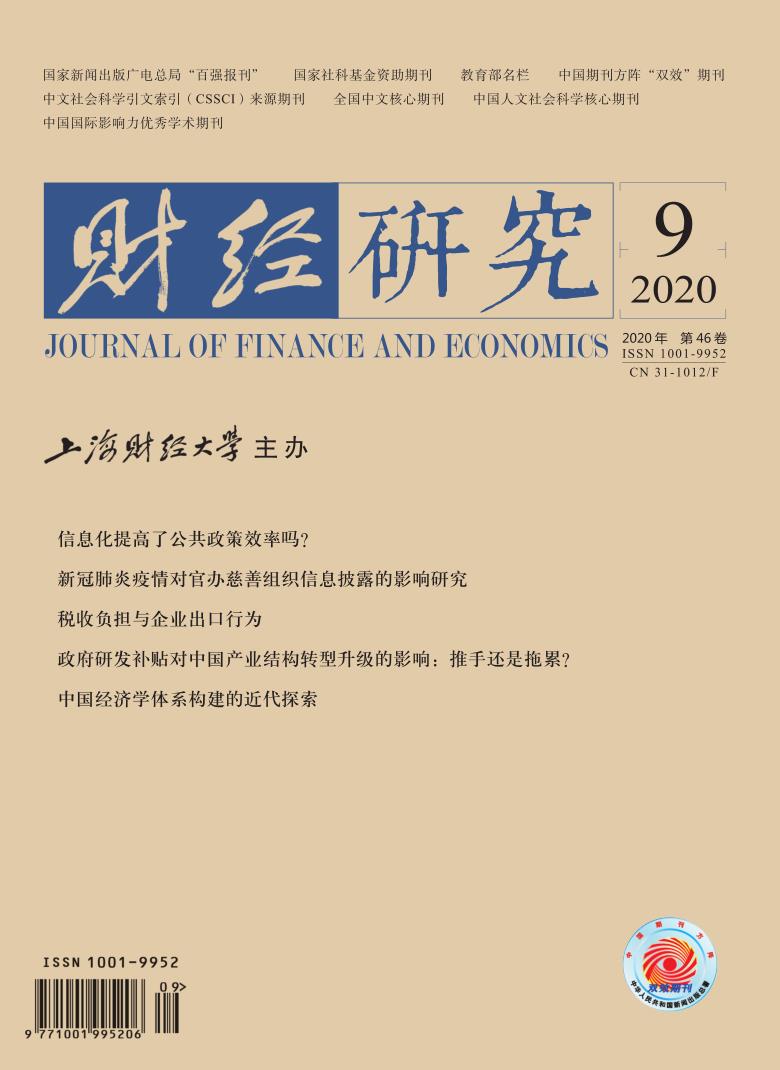前景理论作为行为经济学的基础理论之一,在风险决策方面有突破性的发展,在前景理论框架下,预缴制度不仅可以平滑税收收入,还能够促进纳税遵从,然而不少学者对此提出了质疑。文章采用2013年全国税收调查数据重新检验了预缴退税对纳税遵从的影响,在使用工具变量缓解内生性后,结果表明预缴退税反而会降低纳税遵从,原因在于前景理论仅考虑了汇算清缴期的影响,却未考虑预缴期预缴税款会占用企业现金流,加重企业融资约束,进而降低企业纳税遵从度。因此,文章建议我国预缴制度应当尽可能精确估计收入,减少预缴和实际税款偏差,以此来提高企业纳税遵从度。文章为纳税遵从和前景理论研究提供了重要的现实反例和反思机会。
预缴退税、融资约束与纳税遵从
摘要
参考文献
2 陈作华,方红星. 融资约束、内部控制与企业避税[J]. 管理科学,2018,(3):125−139. DOI:10.3969/j.issn.1672-0334.2018.03.011
5 刘行,赵健宇,叶康涛. 企业避税、债务融资与债务融资来源−基于所得税征管体制改革的断点回归分析[J]. 管理世界,2017,(10):113−129. DOI:10.3969/j.issn.1002-5502.2017.10.009
7 郑宝红,张兆国. 企业所得税率降低会影响全要素生产率吗?−来自我国上市公司的经验证据[J]. 会计研究,2018,(5):13−20. DOI:10.3969/j.issn.1003-2886.2018.05.002
8 Adams C,Webley P. Small business owners' attitudes on VAT compliance in the UK[J]. Journal of Economic Psychology,2001,22(2): 195−216. DOI:10.1016/S0167-4870(01)00029-0
9 Allingham M G,Sandmo A. Income tax evasion:A theoretical analysis[J]. Journal of Public Economics,1972,1(3-4): 323−338. DOI:10.1016/0047-2727(72)90010-2
10 Alm J,McClelland G H,Schulze W D. Why do people pay taxes?[J]. Journal of Public Economics,1992,48(1): 21−38. DOI:10.1016/0047-2727(92)90040-M
12 Andreoni J,Erard B,Feinstein J. Tax compliance[J]. Journal of Economic Literature,1998,36(2): 818−860.
13 Bernasconi M,Zanardi A. Tax evasion,tax rates,and reference dependence[J]. FinanzArchiv/Public Finance Analysis,2004,60(3): 422−445. DOI:10.1628/0015221042396122
14 Carboni O A. An empirical investigation of the determinants of R&D cooperation:An application of the inverse hyperbolic sine transformation[J]. Research in Economics,2012,66(2): 131−141. DOI:10.1016/j.rie.2012.01.002
15 Copeland P V,Cuccia A D. Multiple determinants of framing referents in tax reporting and compliance[J]. Organizational Behavior and Human Decision Processes,2002,88(1): 499−526. DOI:10.1006/obhd.2001.2989
16 Cullis J,Jones P,Lewis A. Tax framing,instrumentality and individual differences:Are there two different cultures?[J]. Journal of Economic Psychology,2006,27(2): 304−320. DOI:10.1016/j.joep.2005.07.003
18 Elffers H,Hessing D J. Influencing the prospects of tax evasion[J]. Journal of Economic Psychology,1997,18(2-3): 289−304. DOI:10.1016/S0167-4870(97)00009-3
19 Engström P,Nordblom K,Ohlsson H,et al. Tax compliance and loss aversion[J]. American Economic Journal:Economic Policy,2015,7(4): 132−64. DOI:10.1257/pol.20130134
20 Hadlock C J,Pierce J R. New evidence on measuring financial constraints:Moving beyond the KZ index[J]. The Review of Financial Studies,2010,23(5): 1909−1940. DOI:10.1093/rfs/hhq009
21 Kahneman D,Tversky A. Prospect theory:An analysis of decision under risk[J]. Econometrica,1979,47(2): 263−292. DOI:10.2307/1914185
22 Kaplan S N,Zingales L. Do investment-cash flow sensitivities provide useful measures of financing constraints?[J]. The Quarterly Journal of Economics,1997,112(1): 169−215. DOI:10.1162/003355397555163
23 King S,Sheffrin S M. Tax evasion and equity theory:An investigative approach[J]. International Tax and Public Finance,2002,9(4): 505−521. DOI:10.1023/A:1016528406214
24 Kirchler E,Maciejovsky B. Tax compliance within the context of gain and loss situations,expected and current asset position,and profession[J]. Journal of Economic Psychology,2001,22(2): 173−194. DOI:10.1016/S0167-4870(01)00028-9
25 Liu Y Z,Mao J. How do tax incentives affect investment and productivity?Firm-level evidence from China[J]. American Economic Journal:Economic Policy,2019,11(3): 261−291. DOI:10.1257/pol.20170478
26 Miguel E,Satyanath S,Sergenti E. Economic shocks and civil conflict:An instrumental variables approach[J]. Journal of Political Economy,2004,112(4): 725−753. DOI:10.1086/421174
27 Morita K. Advance tax payment and tax evasion:Expected utility analysis[J]. The Singapore Economic Review,2014,59(2): 1450014. DOI:10.1142/S0217590814500143
29 Schmidt D R. The prospects of taxpayer agreement with aggressive tax advice[J]. Journal of Economic Psychology,2001,22(2): 157−172. DOI:10.1016/S0167-4870(01)00027-7
30 Slemrod J,Yitzhaki S. Tax avoidance,evasion,and administration[J]. Handbook of Public Economics,2002,3: 1423−1470. DOI:10.1016/S1573-4420(02)80026-X
31 Webley P, Robben H, Elffers H, et al. Tax evasion: An experimental approach[M]. New York: Cambridge University Press, 1991.
引用本文
李昊楠. 预缴退税、融资约束与纳税遵从[J]. 财经研究, 2020, 46(9): 48-62.
导出参考文献,格式为:
上一篇:同城化发展能否改善“集聚阴影”?





 7314
7314  7031
7031

